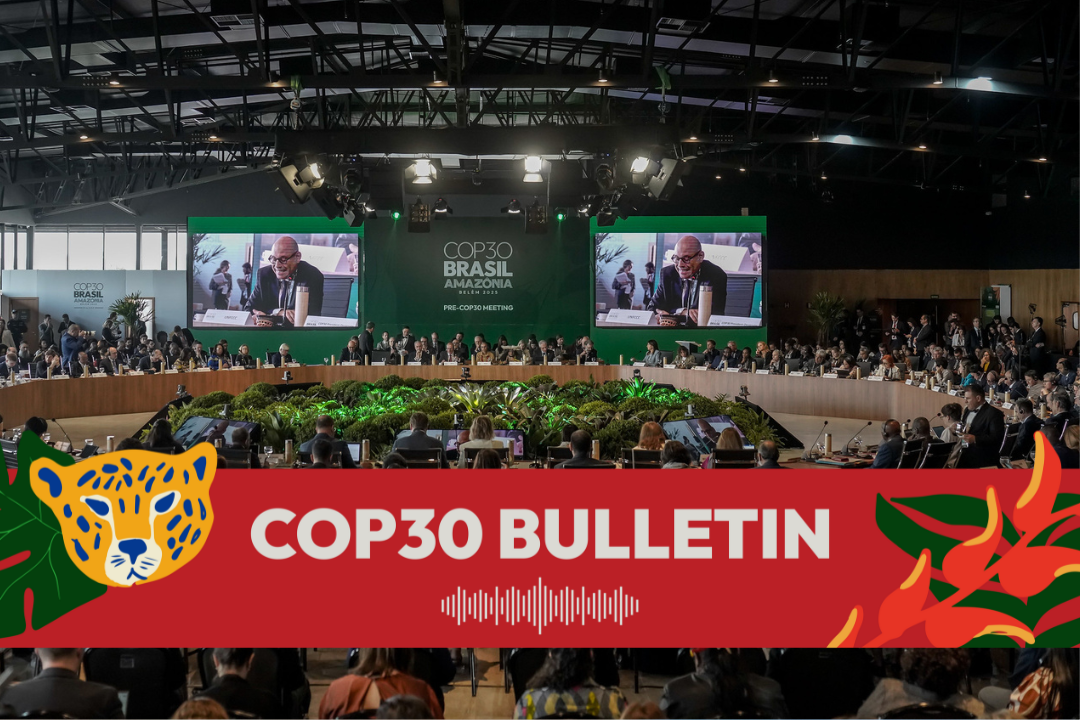COP30 Brasil Bulletin #32 - Pre-COP Sets COP30’s Mission: From Planning to Action
A meeting held in Brasilia, convening representatives from over 70 countries, underscored that COP30 must prioritize the operationalization of existing agreements.Brazil is leading by example, presenting environmental achievements and advancing innovative financing proposals for developing nations. Listen to the special report to learn more.

Report: Inez Mustafa | COP30 Brasil
Voice-over: Rebeca Rodrigues and Nycolas Verly
Reporter: The Pre-COP, which brought together representatives from over 70 countries in Brasilia, left a clear message: COP30 in Belém must be the “COP of Truth,” as stated by Brazilian President Luiz Inácio Lula da Silva at the United Nations. And if you are wondering what that means in practice, we have the answer straight from the key players in the negotiations. A shift in mindset is already underway, and the new guiding principle is implementation. Confirming this turning point is the President of COP30, Ambassador André Corrêa do Lago.
André Corrêa do Lago: In what ways does this COP differ from its predecessor?
It is our declaration that it shall be a COP of implementation. Implementation does not require consensus—it is an exercise rooted in cooperation and mutual support.
Reporter: Brazil enters this new phase with tangible outcomes in hand. Data from the National Institute for Space Research (INPE) reveal a quiet revolution underway: a 98% reduction in wildfires in the Pantanal, 80% in the Amazon, and 42% in the Cerrado, in the cumulative total for 2025—the lowest levels recorded since 1998. These figures demonstrate that reversing the trajectory of environmental degradation is indeed possible. Yet, how can such achievements be transformed into irreversible progress? Minister of Environment and Climate Change, Marina Silva, explains why implementation is more complex than it may appear.
Marina Silva: We are now entering the phase of implementing what has been agreed upon. In doing so, it is essential to establish indicators that demonstrate we are on the path toward effective implementation. Brazil, in particular, presents strong indicators in this regard.
Reporter: Behind the scenes at the Pre-COP, the spirit of action was already palpable. Ana Toni, CEO of COP30, shared the emerging consensus among the more than 600 participants in attendance.
Ana Toni: In the session on climate and nature, for instance, it became evident that there is broad agreement on the need for new economic instruments to enhance the value of nature. It was encouraging to witness such alignment.
Reporter: Brazil arrives at COP30 with one of the most ambitious proposals on the table: the Tropical Forests Forever Fund (TFFF). Unlike traditional climate finance mechanisms, the TFFF is an innovative instrument designed to mobilize 25 billion US dollars to compensate over 70 developing countries for the preservation of their tropical forests. These discussions are already moving beyond the conceptual stage. Demonstrating leadership by example, Brazil has announced a 1 billion dollar contribution to the fund. Minister of Finance Fernando Haddad, who chairs the Circle of Ministers comprising over 35 countries, emphasized the importance of turning theory into practice.
Fernando Haddad: The continuity lies in our commitment to align reflection with implementation—to ensure that the conceptual discussions generated within the Circle are translated into concrete public policy proposals, many of which are already underway in parallel.
Reporter: However, this transformation is not the sole responsibility of governments. Dan Ioshpe, COP30 Climate Champion, underscored the vital role of society at large in this process, which now includes over 3,000 companies worldwide committed to achieving climate neutrality.
Dan Ioshpe: The Climate Champions Team has had the great honor and satisfaction of working collaboratively to accelerate and scale up, as swiftly as possible, the solutions we need to meet the goals of the Paris Agreement.
Reporter: Scaling solutions requires listening to those who have long stood on the front lines of environmental protection. According to data from the Climate Policy Institute, the imbalance in climate financing is stark: in 2023, mitigation efforts received 640 billion US dollars, while climate adaptation—critical to safeguarding vulnerable populations—received only 63 billion. This disparity leaves 3.6 billion people exposed to high levels of climate vulnerability.
It is precisely to address this inequity that the Baku-to-Belém Route gains prominence. This initiative, designed to bridge COP29 and COP30, aims to expand financing for adaptation, ensuring that developing countries receive the resources necessary to build resilience. This principle of climate justice is championed by the Minister for Indigenous Peoples, Sonia Guajajara.
Sonia Guajajara: We bring the essential complement: a just transition that includes people, listens to people, and acknowledges the diversity of lived realities.
Reporter: Just transition, climate finance, adaptation, and implementation. With concrete proposals such as the Tropical Forests Forever Fund and the Baku-to-Belém Route, the outcomes of the Pre-COP underscore that COP30 will not be a final destination—but rather the pivotal turning point the world has long awaited.
Translation: Michel Emmanuel Félix François (POET/UFC)
Proofreading: Tadeu Azevedo (POET/UFC)

